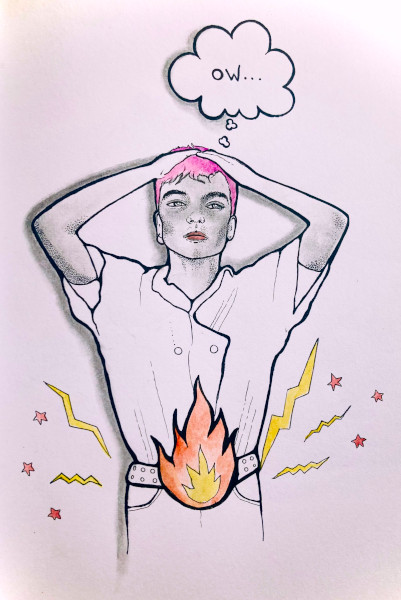‘Just have a glass of wine’
How the medical system dismisses pelvic pain
Illustration by Gabrielle Funk
I relayed each shameful, hidden detail to my doctor, but I waited until the end of our appointment to mention sex. Already at the door, he leaned toward me to offer a prescription.
“Just have a glass of wine.”
He ushered me out the door, grinning conspiratorially, before I could admit I often had sex after smoking or drinking, before I could tell him how many years I had spent in this kind of pain, too.
It’s a common but seldom discussed experience. “Many physicians believe more than half of people of all genders will experience (pelvic pain) at some point in their life,” Mashable reporter Anna Iovine writes.
“When such a sensitive topic isn’t discussed, it’s rendered taboo. People with pelvic pain may feel shame or embarrassment, and that perpetuates the cycle of silence.”
Like Iovine, I learned to ignore the pain. We independently turned to “Dr. Google” and searched phrases like “pain with penetration” and “vagina pain,” neither of us knowing how to articulate exactly what was wrong.
“I knew (my first sexual experience) might hurt and that perhaps I would bleed,” culture reporter Lauren O’Neill writes for The Guardian. “I was okay with that. It was part of the mythology. I imagined that, afterwards, I would stare at myself in the bathroom mirror, like the heroine in my own coming-of-age drama.”
Instead, I winced through sexual experiences. No partner, toy or position ever offered a true respite. I returned to late-night Google searches. Like O’Neill, I read stories “from women who had been suffering for years with no relief, who feel constant, stabbing pain.”
I learned about gender bias in medicine and how doctors are more likely to dismiss pain if a patient was assigned female at birth. This leads to what one BBC writer describes as “an alarming track record of bad medical diagnoses and advice” that includes assumptions about marital problems and suggestions to have a glass of wine or play relaxing music before sex.
“It’s hard to imagine that a medical professional who took an oath to ‘do no harm’ could say these things,” Christin Veasley, a former executive director of the National Vulvodynia Association, says.
Vulvodynia is “chronic vulvar pain without an identifiable cause.” It’s a term I only learned recently, but it explains many of the symptoms I hesitated to share with my doctor years ago.
Last spring, I added a few other medical labels to my vocabulary. Adenomyosis is a chronic inflammatory condition that causes endometrial lining to grow and bleed inside uterine muscle. Its symptoms include dysmenorrhea (severe menstrual cramps) and dyspareunia (painful sex), along with anaemia, fatigue and an enlarged uterus – all of which I’ve experienced.
It took me years to receive an official diagnosis, even though I knew something was wrong.
“Medicine must listen to and believe our testimonies about our own bodies and ultimately turn its energies, time, and money toward finally solving our medical mysteries,” Elinor Cleghorn writes for TIME. “The answers reside in our bodies, and in the histories our bodies have always been writing.” And that answer isn’t a glass of wine.
A former sports broadcaster, Danielle Doiron is now a writer, editor and educator. Find them in Winnipeg, Philadelphia, Fargo and, occasionally, on the airwaves.
Published in Volume 77, Number 02 of The Uniter (September 15, 2022)







